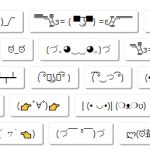Kaomoji is the Japanese version of an emoticon, literally, “face mark”. They are used a lot in Japanese messages. Over the years they have been becoming popular all over the internet.
They are commonly used in online conversations and have been gaining popularity around the world recently. Kaomoji may look simple but they have their own unique taste, culture, and history behind them.
There is no better way to express one’s feelings by using these tiny characters than simply typing up a random kaomoji that your eyes can settle on in a rush of emotions! The Kaomoji tool will be your best companion whether you are late for living or waking up on time today!
Table of Contents
Kaomoji List
Happy
Angry
Apologizing
Love
Confused
Sad
Hungry
Scared
Why Kaomoji is Loved by Youngsters
Kaomoji is loved because it is cute, and can be used for every situation. Small Kaomoji can be used to express a variety of emotions, such as “U” (pained), “:” (confused), etc…
When Emoticons were first introduced in Japan, they were not widely known. Only recently have Emoticons become popular.
However, Japanese emoticons are different from those found overseas – there are many personalities and expressions that cannot be expressed with only text symbols like overseas emoticons contain.
Many youngsters are now using kaomoji instead of emoticons whenever possible; this has been causing problems for the cellphone RPG industry. There is even prayer software designed with Kaomoji characters!
Kaomoji characters have been spreading rapidly over the internet – you will see all kinds of them from “母” (Mother) to “⊂(・ω<)” (The face of a person feeling awkward). There are even some original kaomoji that make no sense whatsoever! Just look at this example below.
Cute Kaomojis like these are being created by users via editing programs every day, and those that catch on start trending through social networking services. Sometimes they even get named after their creator! As such, there are currently about 10 million kaomojis.
The popularity of kaomoji is not limited to just internet message boards and blogs – in fact, it has begun to spill over into the real world due to recent cellphone games that use them.
In the past few years, many cell phone-based RPGs have been popping up, where you can play while walking down the street or riding on a train. These RPGs were designed for those who do not want to stare at a small cellphone screen for long periods of time.
This feature allows players of these games to multi-task; however, this also causes an interesting problem: Some features that rely on Kaomoji cannot be properly expressed!





